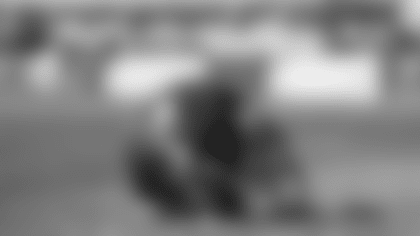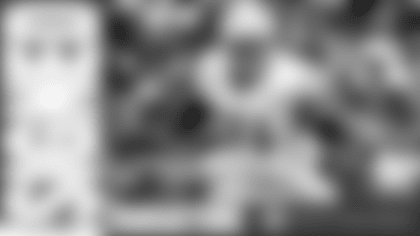After nearly a decade of steadfastly structuring player contracts so that they wouldn't cause salary cap woes in future seasons, the Tampa Bay Buccaneers abruptly switched gears in 2020. The reason was obvious: Tom Brady was coming to town, joining a mostly home-grown roster that was suddenly loaded at almost every other position. For the Buccaneers, it was time to push all their chips to the middle of the table.
And so they did. After signing Brady, the Buccaneers spent three years aggressively adding key contributors to the roster and retaining every significant player who was headed towards free agency. The only way to do so was to ditch the pay-as-you-go philosophy and embrace the sort of contracts that cost less now at the expense of cap hits in the future.
It worked magnificently. The Buccaneers won Super Bowl LV at the end of the 2020 season – the franchise's second championship, and then won consecutive NFC South titles in 2021 and 2022. It was the first time the team had been to the postseason three times in row since 1999-2002 and the first time it had ever won back-to-back division crowns. It also led to the expected consequences: Heading into the 2023 offseason, with Brady riding into retirement, the Bucs suddenly had to deal with a cap overage of more than $50 million dollars and a long list of potential free agency defections.
"If I go back in time I would do it all again," said General Manager Jason Licht, while flanked by cornerback Jamel Dean and outside linebacker Anthony Nelson at a Thursday press conference announcing new deals for both players. "We pushed. We borrowed about $100 million dollars against this year's cap and future cap to do what we did. Came close a second time [to a championship]. If anybody wants to criticize what we did, they can come to any of our three homes and look at our rings. We're happy about that. We're going to pursue another one, too."
That last statement is the hinge for how the Buccaneers' current approach to the cap and player acquisition/retention is going to unfold. In some ways, the team is taking its medicine after those three years of maximizing the Brady window, such as absorbing all of Brady's $35 dead cap hit this year rather than spreading it out over two seasons. The Bucs will also be parting ways with some key players from their most recent championship run, such as ironman left tackle Donovan Smith.
But the team didn't just wake up on February 13, the day after the Super Bowl, discover it was $50 million over the cap and hit the panic button. As clear-eyed as the team borrowed from future caps to fund its Brady-era playoff runs, it was just as certain how it would come out the other end, and part of the plan was to remain competitive despite the tighter restrictions and tough decisions. On Thursday, Licht praised his management team, including Mike Greenberg, Jackie Davidson and John Spytek, for how they've executed the plan.
"We've been working on this plan for a long time, and there were really tough decisions," said Licht. "But I had a lot of confidence in these people. It was a lot of challenges and we were able to get through it. [We're] kinda, sort of coming through the back end of it now, but never once did we ever think that we were not going to be a good team this year. We have a lot of good players, players entering their prime, players in their prime, players who haven't even scratched the surface of their prime. It's the same situation that drew Tom Brady to want to come sign here. It's a very similar team."
Dean and Nelson are examples of players entering their prime, and keeping them off the free agent market against the odds shows how the Bucs are working to maintain a talented core. The signing of Baker Mayfield creates a quarterback competition with young Kyle Trask that hopefully will yield a field general able to take advantage of a talented pass-catching corps. Lavonte David, entering his 12th season, has extended his prime long past when most players do but it was important to bring him back too, if the Bucs truly wanted to compete for the playoffs in 2023.
It helped that players like Dean and Nelson were motivated to stick around even as the Brady era closes.
"It's a great feeling," said Licht. "For all the challenges that we had going into this offseason, yesterday, today is a great day, to see that people still believe in the vision that we have and the ability that we have a football team to still compete for this division. I don't want to say that was 100 percent confident [the Bucs could re-sign their own] because you never know. I knew that everybody here is going to have some opportunities along with coming back here. But I was confident that we would be able to put our best foot forward, and I was confident that they wanted to be here.
"It's a very underrated moment when…the organization signs an extension to the player they drafted, brought up, developed. Sometimes you tend to celebrate the guy that you sign in free agency, lure from another team, a little bit more, but in this case I think we're more excited because it shows that not only do we want them back because we feel like they're great players that are going to help us win another championship, but they also wanted to be here."
The new deals for Dean and David and the acquisition of Mayfield probably mark the most aggressive moves the Bucs will make before the draft, as the cap situation is still somewhat constraining. But with the goal of competing in 2023, Licht and the Buccaneers will continue to look for ways to make the roster better.
"We're not done," said Licht. "We're going to have some more. We have to make a little bit more responsible, or reasonable, signings right now because of where we're at, but sometimes you get your best deals and you get your best contributors from that. These guys wanted to come back. They believe in the vision that we all have here with our coaches, with our front office, and that's going to continue."


































